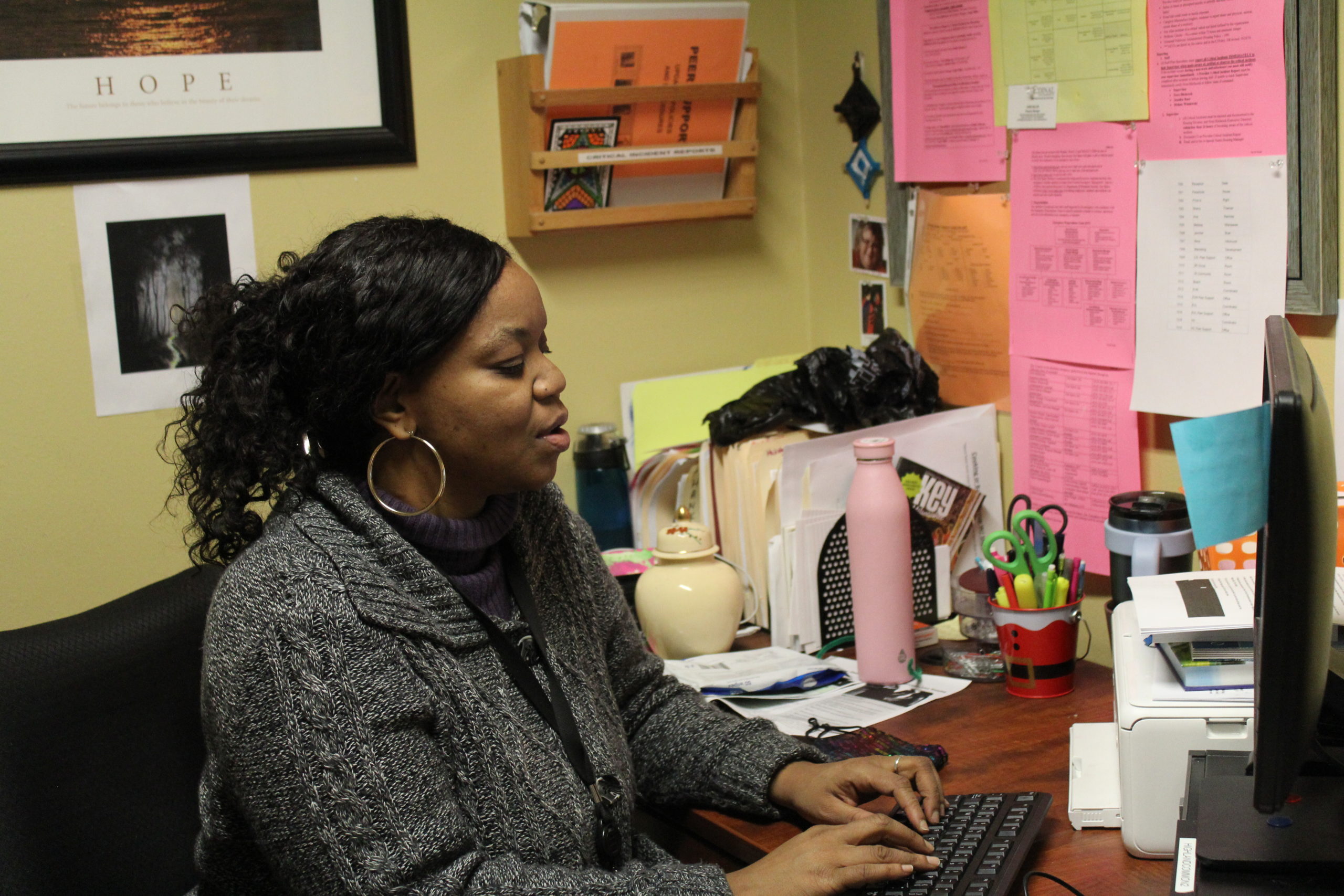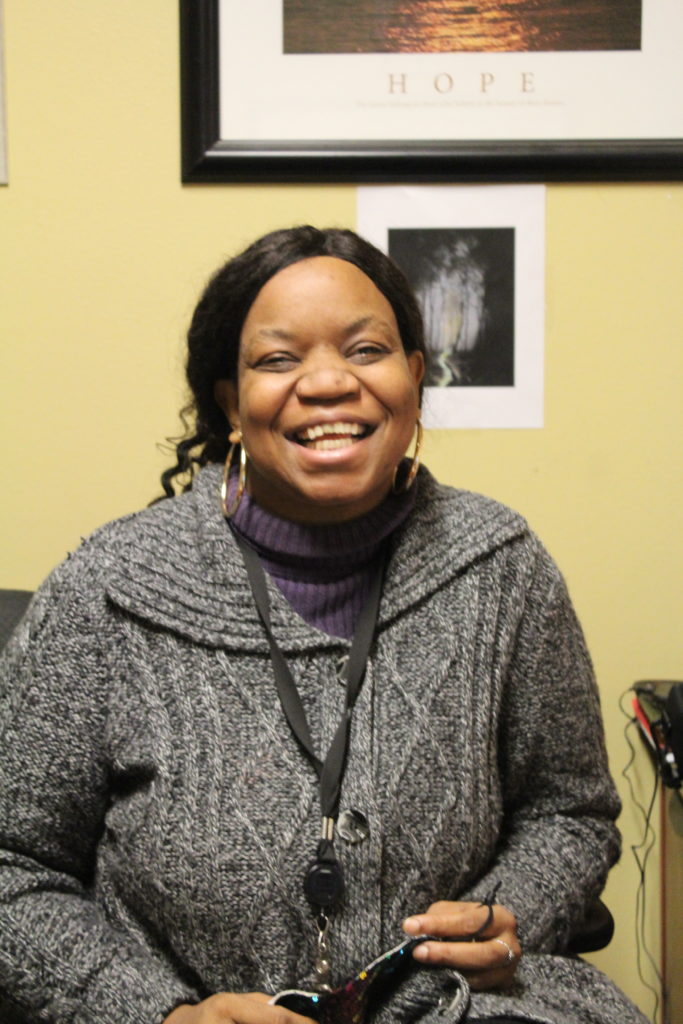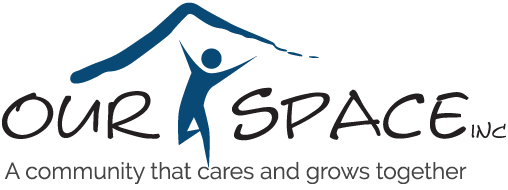
“Just because my eyes don’t work doesn’t mean that I am not a human being, capable of offering the same support and help that anyone else can.”
Shalene Fayne – Our Space Peer Support Specialist
There are people we have the privilege of meeting that just make us want to be better. They cause us to focus less on our problems, and the things we cannot do, and make us strive to work harder and seek to attain greater heights. Our Space Peer Support Specialist, Shalene (Shay) Fayne, is one of those people.
Shay grew up with full vision of the world around her; and it wasn’t always an easy world to see. Some of her earliest memories include extreme unrest. “Because of my experiences as a child, living in an area where violence and gunshots were everyday occurrences, I struggle with PTSD. It was a difficult place to live, but it helps me to have empathy for the people I work with now.”
Her PTSD battles increased after spending over three years in prison. “I made some bad decisions and was pretty angry when I was younger.” One of these decisions, which changed the trajectory of her life, included a street fight, that ended with a homicide. In the end, she was sentenced to 6 years in Techeetah at age 17. “I spent a year in isolation while I was there. I still struggle with social situations because of that experience.”

Despite the less than ideal circumstances, she used her time in prison well. “I was very productive while incarcerated. I finished high school with high scores, and I worked in the kitchen.” In the end, her sentence was reduced to 3-1/2 years and she was released from the maximum-security prison to the minimum-security, Milwaukee Women’s Center.
Life on the other side of her sentence brought a new set of challenges for Shay. “I came out in 2005 with a chip on my shoulder. My father passed away when I was in prison and I couldn’t say goodbye. I was really angry and bitter.” Her path led to an unhealthy relationship in which she was emotionally and physically abused. She also suffered the loss of her first child, who lived for 15 minutes after he was born.
In 2006, life dealt Shay another difficult blow. “I started having headaches and pain in my right eye as well as seeing brown spots. I went to several doctors who told me it was all in my head and there was nothing wrong.” After months with no answers, she was given a free eye exam by a vision specialist at Walmart. “I was told my optic nerve was swollen and I needed to get to a specialist right away.”
Things hit a crisis point when the pressure in her eye started to build. She was admitted to the hospital, diagnosed with pseudotumor cerebri, and underwent an emergency nerve sheath fenestration surgery. “We thought that would be the end of the issues, and once I recovered my vision would be back to normal,” she notes. But that was not the case for Shay. After 11 days of sight, she was rushed back to the hospital to have a ventriculoperitoneal shunt placed in her brain, to drain fluid into her small intestines. That was when Shay’s world went blank. “I was totally blind from that point on.”
While she struggled with anger because of her circumstances, Shay’s family was by her side to help her adapt to her new world. “They were not about to let me wallow in self-pity.” Her brother was one of her biggest cheerleaders. “He said Shalene, you are not going to rely on others to do everything for you. He even broke off the handle of broomstick and started to teach me how to use it as a cane.” In addition to her family, Shay received training from the nonprofit association, Vision Forward. “They helped me learn how to cook, clean, use public transportation, and generally navigate my community.” She was also taught how to use technology specifically geared toward individuals with vision impairments.
Once she learned to navigate the world without sight, her mind was opened to the possibilities of what she could become. In 2007, Shay enrolled in Milwaukee Area Technical College and obtained an associate’s degree in Human Services. She later went on to become the first totally blind individual to attend Alverno College and graduated in 2015 with a bachelor’s degree in Women and Gender Studies and a minor in Psychology. She immersed herself in the college experience and was even a proud member of the Alpha Kappa Alpha Sorority.
Finding a job upon graduation proved difficult, given her visual impairment. “As soon as they found out I was blind, I was quickly turned away. Apparently, you have to be able to see to drive a car,” she jokes. Shay also faced challenges at home as a new mom to a daughter diagnosed with autism. But She had two degrees, and a Peer Support certification, and was determined to use her story to make a difference.
Eventually her job coach connected her with Nora Hitchcock, the Executive Director at Our Space. They quickly put her to work as a Peer Support Specialist for the Highland Commons supportive housing facility. “Nora and the Our Space team welcomed me with open arms. She ensured that I would pass the necessary background checks, despite my criminal record, and worked with Vision Forward, to put the tools in place to assist me in doing my job.”
In addition to technology for the visually impaired, including a screen reader and a voice recorder, there is always another team member on hand to support Shay during her shift. They also employ simple tactics like making sure things are always put away in the same spot so that Shay can easily find what she needs. “Our Space is like a family. They truly care about me as a person and make sure I have what I need to succeed. Even something as simple as putting my mind at ease about transportation. They just tell me ‘don’t worry, we’ll make sure you get here.’”
Shay’s favorite thing about her role as a Peer Support Specialist has everything to do with helping others be the best version of themselves. “I love to see the change in people. It is rewarding to help our residents to do something different and move forward positively.” The job does not come without its share of challenges though. “It can be hard to get people to understand that I can do anything anyone else can do, despite my impairment.” She recalls times when residents ask for someone else to help because they think she is incapable. “I just say ‘no they are busy, so you are just going to have to deal with me helping you.’”
While her impairment can be a challenge, Shay is a master of developing strategies for success. “One time a resident asked for help navigating a Zoom call on a computer that wasn’t set up for a visual impairment. “The resident was unsure if I could help but I said, ‘I’m willing to try, are you?’” Shay suggested the resident read what was on the screen and she walked them through the entire set-up process. While it might have been easier if she was sighted, Shay taught the resident an important lesson in overcoming obstacles that day.
She has grown, and adapted well, to her role at Our Space since she began in June of 2019. Shay can name each one of the 50 residents by the sound of their voice and even discern several by the jingle of their keys or the sound of their footsteps.
In the end, Shay wants people to treat her like everyone else. “They need to be open to getting to know the inside and not judge.” She also hopes that her story is an example for others, including her 3-year-old daughter, Madison. “I want her to know that I am strong, and resilient, and determined to overcome anything. But I also want her to know that she can also overcome her challenges if she puts forth the effort and keeps striving for greatness.”
